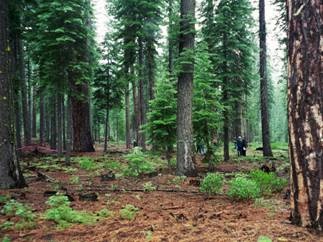
Climate Legislation Marks Monumental Advance
California Convention – OCT 10th and 11th
Save Trees Even as You Save Water
Remembering Us When You’re Gone

Climate Legislation Marks Monumental Advance
By Kathryn Phillips
As I write this at lunchtime on Friday to meet our newsletter deadline, the California Assembly still has not taken up SB 350, the landmark bill to move California farther forward in addressing climate change.
So rather than being able to announce good news, I can only anticipate good news: the Assembly will pass the bill, the Senate will concur, and the governor will sign this legislation.
The result will be that by 2030, at least half the electricity we use in California will come from renewable resources. And at the same time, the energy efficiency of buildings in California, when taken all together and averaged, will at least double.
In any other year, legislation pushing either of these results--a 50 percent renewable portfolio standard and a doubling of building energy efficiency--would have been a big gain. To get both of these goals through in a single year is monumental.
However, the gain was overshadowed a bit in the last week of the legislative session when the bill's lead author, Senate President Pro Tem Kevin de Leon, and Governor Jerry Brown announced that a third goal, reducing dependence on oil in the transportation sector, would be removed from the bill.
A sizable collection of Democratic Assembly members were refusing to pass the bill as long as the petroleum reduction goal was in the legislation. For months, oil companies had been running a high-priced media campaign to frighten voters about SB 350. The companies made wild claims--lies, actually--that the state would ban certain autos and ration gas.
Sierra Club organizers working in the San Joaquin Valley and the Inland Empire attempted to counter the oil industry pressure. They worked with volunteers canvassing neighborhoods in Assembly districts, posting yard signs, collecting petition signatures, meeting in district with legislators or their staff. They worked to make sure that the legislators knew that constituents want clean air and better alternatives to petroleum dependence.
Sierra Club staff--local chapters, state chapter, and national--sent alerts and got hundreds of calls from constituents into targeted legislators. We talked to the media, placed op-eds, got letters-to-the-editor crafted and placed. We also walked the Capitol, lobbying legislators.
In the end, we couldn't beat oil money this time. But we still came out of the fray with strong SB 350 legislation and bold statements from legislative leaders and the governor about the need to cut oil dependence and determination to do so with other tools, including regulations.
Although headlines in recent days have focused on the very important climate bill, there have been lots of other environmental bills moving as well.
As of this writing, two key bills that address oil pipeline safety and oil spill response have cleared both houses, and one other is expected to clear later today. A bill that bans the sale of ivory and one that bans the use of bull hooks on elephants in zoos and other wildlife also cleared both houses.
Unfortunately, a bill that would have closed a loophole that allows new oil drilling off the Santa Barbara Coast, SB 788, failed. A victim of oil industry lobbying of the Assembly, the bill will be revived in January by its author, Sen. Mike McGuire.
For more information about our priority bills and the outcome on their votes, check out our website in about a week.
California Convention – OCT 10th and 11th
There’s still time to grab a friend and sign up!
Do you know someone who’d love to get more involved in conservation policy and organizing to win at the Capitol? The annual Sierra Club California convention is the perfect event to get them introduced to the issues and the leaders.
This year’s convention theme is empowerment. It features working sessions for volunteers to improve their skills for meeting with legislators in their district offices, creating welcoming meetings and chapters, and incorporating diversity, equity and inclusion into the local chapter ethos.
Our keynote speaker will be Manuel Pastor, a professor of Sociology and American Studies and Ethnicity, and director of the Program for Environmental and Regional Equity, at the University of Southern California. Professor Pastor’s expertise includes demographic change, economic inequality, and community empowerment. He has been a leading voice in a range of important environmental policy discussions statewide, from climate change to state parks.
The two-day convention runs from Saturday morning, October 10, through midday on Sunday, October 11. It takes place in San Luis Obispo County at the Rancho El Chorro park and public meeting facility. You can find more details here.
Every Sierra Club member is welcome to attend, and admission is low: Attending the entire weekend, including rustic lodging in a bunkhouse-style cabin or pitching your own tent, from Friday evening through Sunday morning, costs just $60. Lunch and dinner on Saturday and breakfast on Sunday are included. If you attend for just one day, the fee is $30. Even then, nobody is turned away from the meetings due to lack of funds and some scholarships are available.
Sign up now! You’ll make new friends and get a chance to learn more about how you can be a more effective Club member.

Save Trees Even as You Save Water
By Kyle Jones
Californians have done an amazing job reducing urban water use during the drought. This July, urban use dropped 31.3%, far exceeding the 25% mandate by the state.
Most urban water savings are achieved through reducing water used on outdoor irrigation, which can represent up to half of a home’s total water use. Most of the state has adopted a “gold is the new green” mindset, killing lawns to save water.
Despite cutting outdoor water use, we need to be mindful to not let this drought leave permanent damage in the urban landscape by ignoring trees. Trees provide multiple benefits to air and water quality, as well as lowering temperatures that can help save energy. Trees can improve property values and simply make neighborhoods a nicer place to live. They also cannot be replaced as easily as other plants.
Trees can be protected without increasing water demand. Tree watering can be made efficient by ensuring that watering is done correctly. Mature trees should be watered about once a week in the morning or after the sun sets. Watering should be specialized to target the tree separately, such as through drip irrigation or using a hose. Another trick is to keep a bucket in the shower and use captured water for trees to negate water demand entirely.
Trees are a precious resource that make our urban environments feel like home. California has done well adjusting to drought, but we can do more to protect ourselves from long-term effects by saving trees.

Remembering Us When You’re Gone
By Karen Maki, Fundraising Chair & CNRCC Chair
What will be my legacy when I am gone?
We are often tempted to put off dealing with this question. My impending 2006 month-long trip to India finally moved the question to the top of my to-do list.
Going to India on a Buddhist pilgrimage with five strangers seemed a bit risky, definitely an adventure. I thought if something happens to me, my family needs my assets. I need to not let them get tied up in probate.
So I hired an attorney to draw up a living trust and a will for me. It wasn’t hard. He asked me who I wanted to leave my assets to. Right after my family, I thought about the Sierra Club.
I have spent a good deal of my retirement time volunteering for the Sierra Club. I care so deeply about our forests, our water and that we eventually take strong actions to combat climate change. I want our efforts to continue when I can no longer personally do the work.
Many of these decisions – such as whether privately-owned forests are clearcut and how quickly we will move to 100% clean energy - are made at the state capitol in Sacramento. So I decided to leave money to Sierra Club California to ensure that there are advocates in our state capitol fighting to protect California’s environment in the future.
If you also would like to ensure that Sierra Club California’s work continues, contact Sierra Club California staffer Meg Gunderson at meg.gunderson@sierraclub.org or 916-557-1100x110. She will walk you through the process.
There are other options than putting Sierra Club California in your will or living trust. You can also make the Sierra Club California the beneficiary of your life insurance policy, IRA or retirement plan. You may wish to consider the financial benefits of a life income trust. Many people have realized significant advantages by using a major portion of a planned bequest for the establishment of such a trust.
Follow Us:
  |
Thank you for being a part of our work! You may securely donate online or by sending a check to Sierra Club California at 909 12th Street, Suite 202, Sacramento, CA 95814.
